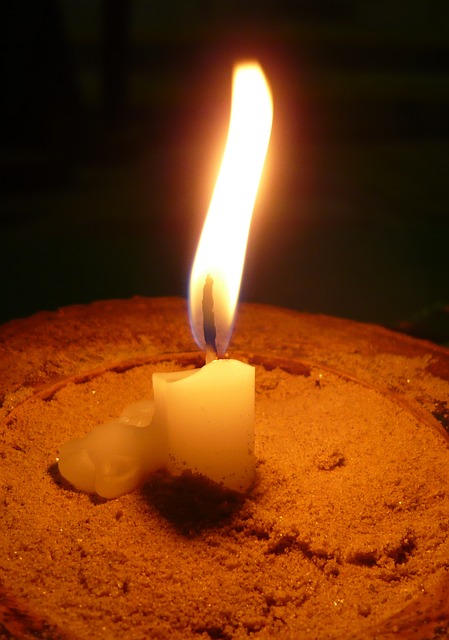In Unitarian Universalism, it is common to hear people say that they are going to “light a candle” for someone, or some event, or some issue that concerns them. Our central symbol in worship services has become the flaming chalice, and at each Sunday Service, even at smaller gatherings–even business meetings–we begin by lighting a flame that burns from within a bowl like container called “the chalice.” The practice of lighting the chalice emerged from World War II from the Unitarian Service Committee whose work helped find safe passage out of Europe for many who were threatened by the Nazis, but the symbol, often portrayed from a drawing known among Czechs with the words “truth prevails” eventually became this actual practice: lighting the flaming chalice.
When word comes to me that  someone I know or care about is suffering in some way, I light a candle. When I have a worry or a fear or a painful experience, I light a candle. When I learn of someone who is near death, I light a candle. When I learn that someone has just died, I light a candle. When I learn that a woman is going into labor to give birth, I light a candle. I usually light candles like this for things, people and issues that are personal to me, but I also light candles for people that I don’t know–because they are dear to people that I do know. There is something of the interdependent web of all existence in this, for me.
someone I know or care about is suffering in some way, I light a candle. When I have a worry or a fear or a painful experience, I light a candle. When I learn of someone who is near death, I light a candle. When I learn that someone has just died, I light a candle. When I learn that a woman is going into labor to give birth, I light a candle. I usually light candles like this for things, people and issues that are personal to me, but I also light candles for people that I don’t know–because they are dear to people that I do know. There is something of the interdependent web of all existence in this, for me.
Why do this candle lighting? Is it some form of magic? I guess that depends on your definition of magic, but for me it is an act that allows me to acknowledge human pain, suffering and struggle. In that act I acknowledge the pain, but I also articulate–sometimes out loud–sometimes in the quiet sanctuary of my heart the truth, the hope, the love, the faith, the relationship and trust that prevail despite this loss or impending loss.
We have a small round table in one corner of a room in our house. It has a simple cloth, a bell, and chalice, and a small but heavy glass container for votive candles. This is where we light candles for the losses we experience. It is our little altar of letting go and of overcoming. When I light a candle, it reminds me every time I pass that little table that my hurt is being tended, that my hope is kindled. In some unspeakable way, it really becomes a beacon for me in the dark, and I am reminded of Rumi’s words about the “visitors” that come to us each day, many of whom are not what we would choose:
” . . . and be grateful for whatever comes, because each one has been sent as a guide from beyond.”
Bob Patrick
